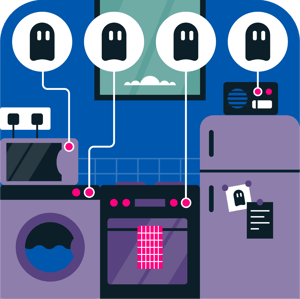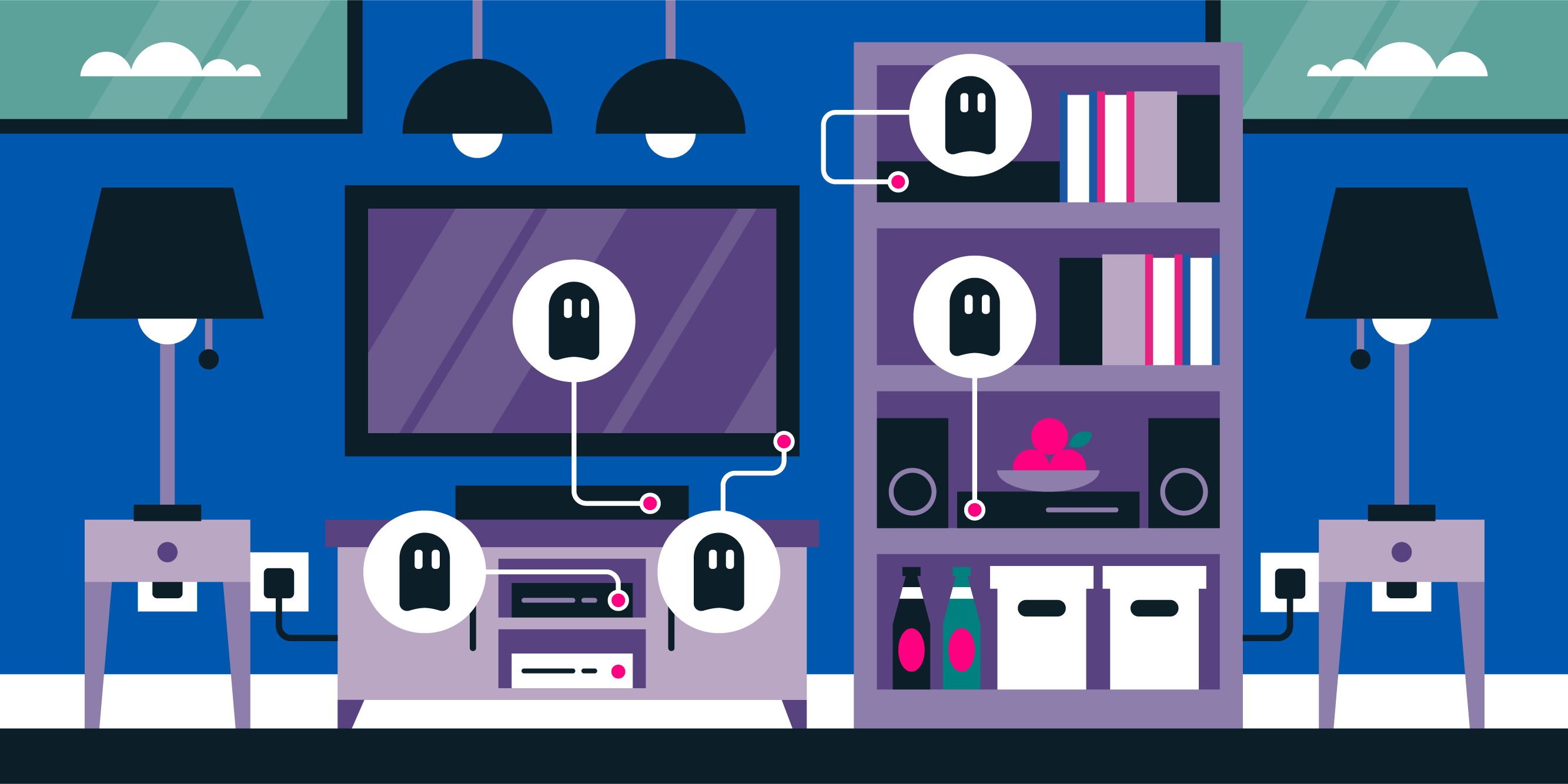Phantom Load: Understanding Your Hidden Energy Costs
You use the remote to turn off the television, flick the light switch off and head to bed. All is quiet in the house and all your appliances are switched off. Or are they?
That silence and apparent inactivity can be misleading. In most rooms, you probably have at least one home appliance or device that's on or on standby, quietly continuing to drain electricity in the background - whether you’re aware of it or not!
This is part of what’s known as your ‘Phantom Load’ and if you don’t have a grip on it, you’re needlessly spending money on wasted energy.
Up to 30% of the average electricity usage could be Phantom Load - do something about it! Get more from your smart meter with Loop.
What is Phantom Load?
Phantom Load is the name for the energy used by appliances left switched on or on standby in your home, adding to your energy bill without you necessarily knowing about it. They can be categorised in three ways.
-
- Modern electronics or appliances left plugged in or on standby.
Turning devices off rather than leaving them on standby is a good idea - they do use energy whilst on standby and this adds to your energy costs. But with modern electronics the amounts we're talking about are only small - you will save money by turning off your TV for example, but not that much (£1.38). The bigger savings are from a better understanding of these other two categories: - The things you know are on but don't know what they're costing.
For example, do you know how much your electric towel rail costs you each day? How about your electric underfloor heating? Or those halogen spotlights? We have listed some indicative costs below. Once you’re armed with this information, you can then make smart decisions about using your things more efficiently. - Forgotten-about appliances, particularly old electronics and old appliances left plugged in or on standby.
We all have those easy-to-forget appliances like set-top boxes, games consoles or old computers that are just left running. You may even have an extra drinks fridge that you used for that party or old freezer in the garage that you needed over Christmas but then forgot to switch off. All of these can quietly guzzle energy without you realising, particularly if they're older units, making them some of the biggest energy-draining culprits. Identifying and addressing them can lead to significant savings.
- Modern electronics or appliances left plugged in or on standby.
Understanding Phantom Load and what’s contributing towards it is vital if you’re looking to save money on your energy bill. Our research revealed the average UK household could be wasting up to £250 on their Phantom Load annually. As wasted energy contributes to up to a third of an average energy bill, it’s a simple way to make a big impact.
Dr Steve Buckley, Head of Data Science at Loop, says:
“The cheapest energy is the energy you don’t use! Understanding whether your phantom load is low, medium or high is the first step toward reducing your energy bill. Using a free app like Loop can help you understand how your household uses energy and empower you to make smart decisions about using less.”
Phantom Load Savings
You may already be aware that appliances continue to drain energy, even when left on standby. However, whilst it’s definitely sensible to turn things off rather than leave them on standby, the savings here are relatively small.
The bigger energy stealers that you need to focus on are the things that are left on all the time, either intentionally or accidentally. You might leave them on because you don’t realise how much they’re costing to run, or accidentally because you’ve just forgotten about them.
Things that fall into these categories include computers, media servers and set-top boxes, plus easy-to-forget things like underfloor heating, heated towel rails and extra drinks fridges.
If you’re only going to make one change towards cutting your Phantom Load, these are the appliances that will unlock the biggest savings.
| Common Phantom Load culprits | Average annual cost (26p per unit) |
| Extra fridges, old fridges or 'beer fridges' | £102 |
| Desktop computers | £84 |
| Faulty set-top box recorder | £158 |
| Over-sensitive outdoor security lights | £53 |
| Traditional (non-smart) electric heating (heating empty home - 40% of time) | £783 |
| Electric underfloor heating (1 extra hour per day) | £327 |
| Two 60w outside lights left on 10hrs per night | £132 |
| Electric towel rail | £61 |
However, some energy-hungry appliances like your fridge and freezer need to stay on all the time. For these things, it’s best to focus on efficiency and running costs to know when it's time to replace them with an upgraded model. An older or less efficient model could easily cost twice or three times as much to run as the most efficient models!
The Cost of Leaving Appliances on Standby
Once you’ve tackled the bigger things, it’s time to mop up the last of the Phantom Load savings by switching off smaller standby appliances in your home. Whilst the savings are more modest, they're still worthwhile.
| Standby appliances | Average annual cost (26p) |
| Digital TV box (left on) | £29 |
| Multi-room speakers (in idle mode) | £29 |
| Router (left on) | £7.94 |
| Microwave (left on) | £0.90 |
| Digital clock (left on) | £2.70 |
| TV (on standby) | £1.31 |
| Coffee maker (left on) | £1.76 |
| Phone charger (plugged in, not charging) | £0.37 |
Top Tips to Cut Your Phantom Load
- Try Loop! Before you can reduce your Phantom Load, you need to identify which things are using the most power. Then you’ll be able to see where savings can be made. That’s where Loop can help. If you measure it, you can control it!
- Go on a Loop Snoop. Use our map to identify the energy-hungry culprits adding pounds to your bill. The simple rule of thumb is that anything that is hot or cold will be using a lot of energy, probably more than you realised.
- Invest in standby savers and multi-socket extensions. These devices enable you to turn off multiple plugs at once. Upgrade to a smart version and you’ll be able to turn your things off remotely, using your smartphone.
- Involve the whole family. If you simply forget to turn your devices off standby, then make it part of your family’s bedtime routine. If you explain Phantom Load to kids, they may turn out to be eager helpers.
- Check to see if your standby devices have an Eco mode. Many set-top boxes can be scheduled to go to sleep every night and you can also adjust the brightness of the lights on many wireless routers.
- Change your appliance settings. Have you tried changing the settings on your phone, laptop, PC or Server to make them more energy-efficient? For laptops and phones, this also helps them to last longer between charges.
• • •
Cut Your Energy Bill With Loop
Loop is a FREE energy-saving app that links to your smart meter, analyses your energy use and shows you easy ways to save. On average, Loop users cut their energy use by 15%! How much could you save?








